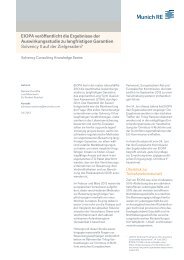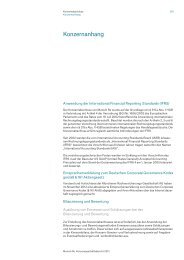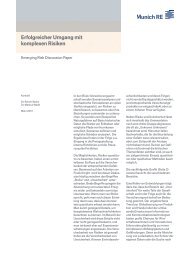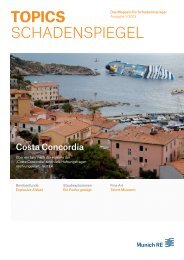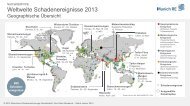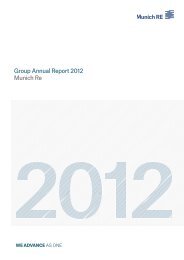Munich Re Group Annual Report 2006 (PDF, 1.8
Munich Re Group Annual Report 2006 (PDF, 1.8
Munich Re Group Annual Report 2006 (PDF, 1.8
You also want an ePaper? Increase the reach of your titles
YUMPU automatically turns print PDFs into web optimized ePapers that Google loves.
<strong>Munich</strong> <strong>Re</strong> <strong>Group</strong> <strong>Annual</strong> <strong>Re</strong>port <strong>2006</strong> Management report_Prospects<br />
The insurance industry must cope not only with macroeconomic<br />
uncertainties but also with political risks, including<br />
state influence on private health insurance and other disadvantageous<br />
measures in the field of social, economic<br />
and tax policy. Political influences have grown steadily in<br />
recent years and these are complicating business management<br />
prognoses.<br />
There are regulatory risks, too, as supervisory regulations<br />
are undergoing revision worldwide and requirements<br />
for reporting, capitalisation and even fundamental assessment<br />
of individual types of business are changing.<br />
Markets continue to be subject to the risk that unexpectedly<br />
intense competition – whether from new or established<br />
providers – may have a negative influence on price<br />
levels. Keeping a clear focus on profitability before growth<br />
and on the efficiency of management systems will remain<br />
critical for success.<br />
Development of the <strong>Munich</strong> <strong>Re</strong> <strong>Group</strong><br />
<strong>Re</strong>insurance<br />
<strong>Re</strong>insurance offers considerable promise for the future,<br />
and we project that it will grow worldwide in the next<br />
decade. The development of property-casualty business is<br />
likely to be surpassed by the dynamic growth of life and<br />
health reinsurance. We predict the highest percentage<br />
growth rates will come from the emerging markets of Asia<br />
and Latin America. Given their higher starting level, Europe<br />
and North America should attain significantly greater<br />
absolute growth, albeit with lower percentage increases.<br />
Thanks to our global presence and special initiatives to<br />
expand our business in rapidly growing regions, the<br />
<strong>Munich</strong> <strong>Re</strong> <strong>Group</strong> is excellently positioned to take advantage<br />
of market opportunities in all areas of the world and<br />
in all fields of business.<br />
In life reinsurance, premium income will experience a<br />
moderate decline in 2007, due to the scheduled reduction<br />
of a reinsurance treaty with a large premium volume. To<br />
consistently exploit new opportunities in the emerging<br />
markets, we have appreciably expanded our units specialised<br />
in the private-provision market, most recently by<br />
setting up a new life reinsurance subsidiary in Moscow.<br />
Fundamental growth impulses for our future new business<br />
should also come from other developments, e.g. the<br />
restructuring of the European solvency regime (Solvency<br />
II), the continuing privatisation trend in old-age and disability<br />
provision, and the dynamic expansion of the life<br />
insurance markets in Asia and eastern Europe.<br />
At present, a host of opportunities for growth in various<br />
business models are opening up worldwide in the health<br />
segment. By integrating primary insurance and reinsurance<br />
as well as extensive services, we cover more than the<br />
insurance industry’s typical value chain. Throughout the<br />
whole treatment process – from searching for the right<br />
specialist, through diagnosis and therapy, to rehabilitation<br />
– we provide services whose benefits go far beyond insurance<br />
itself. We will further intensify the close cooperation<br />
between <strong>Munich</strong> <strong>Re</strong> and DKV in selected foreign markets.<br />
In past years, we have laid the foundations in propertycasualty<br />
reinsurance for the sustained profitability of our<br />
business by consistently adhering to risk-adequate prices,<br />
terms and conditions, even in phases with a fortuitously<br />
low incidence of major losses. Only in this way can we<br />
cope with potential peak burdens which can occur at any<br />
time. That is why the renewals at 1 January 2007 (which<br />
involved approximately two-thirds of our property-casualty<br />
business) were satisfactory overall, despite the low<br />
natural catastrophes burden in <strong>2006</strong>. The development of<br />
reinsurance prices, terms and conditions varied considerably,<br />
depending on the class of business and region concerned.<br />
We did not observe a globally uniform reinsurance<br />
cycle. The trend away from proportional business towards<br />
non-proportional forms of cover continued.<br />
Following the substantial price increases for natural<br />
catastrophe risks in the US market in the previous year, we<br />
were able to maintain and in some cases even significantly<br />
increase their prices. The renewals of large multinational<br />
property and liability treaties proved very satisfactory, with<br />
prices, terms and conditions remaining stable, and we<br />
again recorded growth in attractive agricultural business.<br />
By contrast, there were further price reductions in European<br />
industrial business, parts of aviation business, and<br />
German and French motor liability business. We systematically<br />
refrained from writing business that did not meet<br />
our stringent requirements, and we also terminated<br />
unprofitable proportional treaties in the highly competitive<br />
121



